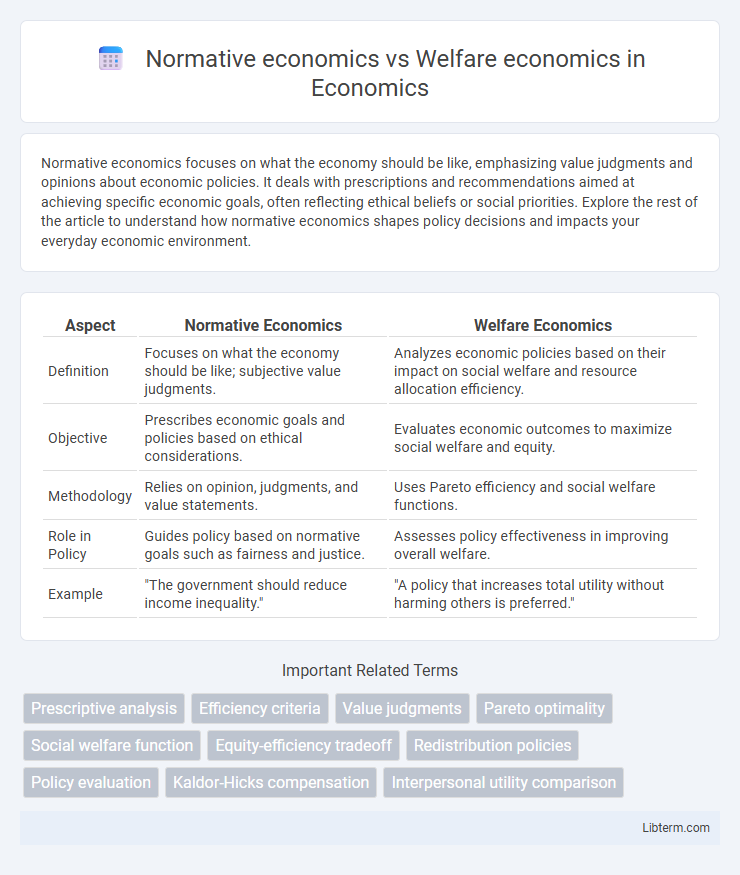Normative economics focuses on what the economy should be like, emphasizing value judgments and opinions about economic policies. It deals with prescriptions and recommendations aimed at achieving specific economic goals, often reflecting ethical beliefs or social priorities. Explore the rest of the article to understand how normative economics shapes policy decisions and impacts your everyday economic environment.
Table of Comparison
| Aspect | Normative Economics | Welfare Economics |
|---|---|---|
| Definition | Focuses on what the economy should be like; subjective value judgments. | Analyzes economic policies based on their impact on social welfare and resource allocation efficiency. |
| Objective | Prescribes economic goals and policies based on ethical considerations. | Evaluates economic outcomes to maximize social welfare and equity. |
| Methodology | Relies on opinion, judgments, and value statements. | Uses Pareto efficiency and social welfare functions. |
| Role in Policy | Guides policy based on normative goals such as fairness and justice. | Assesses policy effectiveness in improving overall welfare. |
| Example | "The government should reduce income inequality." | "A policy that increases total utility without harming others is preferred." |
Introduction to Normative and Welfare Economics
Normative economics involves value judgments about what the economy should be like or what particular policy actions should be recommended to achieve desired goals. Welfare economics evaluates economic policies based on their impact on the overall well-being or welfare of society, using criteria such as efficiency and equity. Both fields address different aspects of economic analysis, with normative economics prescribing ideals and welfare economics assessing outcomes to guide policy decisions.
Defining Normative Economics
Normative economics involves value judgments and opinions about what the economy ought to be like or what goals economic policies should achieve, focusing on prescribing policies based on ethical considerations. It contrasts with welfare economics, which quantitatively evaluates economic outcomes to determine the optimal allocation of resources for social welfare. Defining normative economics centers on its role in shaping policy recommendations influenced by subjective criteria rather than empirical analysis alone.
Key Concepts in Welfare Economics
Key concepts in welfare economics include Pareto efficiency, which assesses resource allocation where no individual can be made better off without making someone else worse off, and social welfare functions that aggregate individual utilities to evaluate societal well-being. Equity or fairness considerations also play a critical role, balancing efficiency with distributive justice to address economic inequalities. These principles guide normative economics by providing criteria for evaluating economic policies based on their impact on social welfare.
Major Differences Between Normative and Welfare Economics
Normative economics centers on value judgments and what economic policies ought to be, emphasizing subjective opinions about fairness and economic goals. Welfare economics evaluates economic policies based on their impact on social welfare, using objective criteria like efficiency and equity to assess outcomes. The major differences lie in normative economics' prescriptive nature versus welfare economics' descriptive and evaluative approach concerning social well-being.
Role of Value Judgments in Economic Analysis
Normative economics inherently involves value judgments as it prescribes what the economy should be like, emphasizing ethical considerations and societal goals in economic policy recommendations. Welfare economics evaluates economic outcomes based on social welfare criteria, integrating value judgments to assess and guide resource allocation for maximizing collective well-being. Both fields contrast positive economics by incorporating subjective perspectives on fairness and desirability, shaping economic analysis beyond empirical data alone.
Tools and Methods Used in Welfare Economics
Welfare economics employs tools such as social welfare functions, Pareto efficiency, and cost-benefit analysis to evaluate economic policies based on their impact on social welfare and resource allocation. Techniques like compensation criteria, utility possibility frontiers, and equity-efficiency trade-offs are used to measure and compare societal well-being. Unlike normative economics, which expresses value judgments, welfare economics provides a systematic framework for analyzing policy outcomes with quantitative and qualitative methods.
Policy Implications of Normative Economics
Normative economics plays a crucial role in shaping policy decisions by incorporating value judgments about what economic outcomes ought to be, guiding policymakers in setting priorities and goals based on ethical considerations. It contrasts with welfare economics, which analyzes economic policies based on their efficiency and overall impact on social welfare without prescribing specific value-based judgments. Policy implications of normative economics include the formulation of redistributive measures, taxation policies, and regulatory frameworks aimed at achieving equitable resource allocation and social justice.
Measuring Social Welfare: Approaches and Challenges
Normative economics evaluates social welfare using value judgments about what ought to be, often relying on ethical frameworks and societal goals to guide policy recommendations. Welfare economics measures social welfare by analyzing resource allocation efficiency and equity through tools like Pareto efficiency, social welfare functions, and cost-benefit analysis, but faces challenges in aggregating diverse individual preferences and addressing interpersonal utility comparisons. Both approaches encounter difficulties in quantifying welfare due to subjective values, data limitations, and the complexity of balancing efficiency with equity in social outcomes.
Criticisms and Limitations of Each Approach
Normative economics faces criticism for its inherent subjectivity, as value judgments can lead to biased policy recommendations lacking empirical validation. Welfare economics is limited by its reliance on assumptions like cardinal utility and interpersonal utility comparisons, which often do not hold true in real-world scenarios. Both approaches struggle with measuring individual welfare objectively, complicating the formulation of universally accepted economic policies.
Conclusion: Integrating Normative and Welfare Perspectives
Integrating normative and welfare economics enriches policy analysis by combining value judgments with empirical welfare measures, leading to more balanced decision-making frameworks. Normative economics provides ethical guidelines reflecting societal preferences, while welfare economics offers tools to evaluate resource allocation efficiency and equity. Together, they facilitate comprehensive assessments that aim to enhance social welfare through informed, value-conscious economic policies.
Normative economics Infographic

 libterm.com
libterm.com